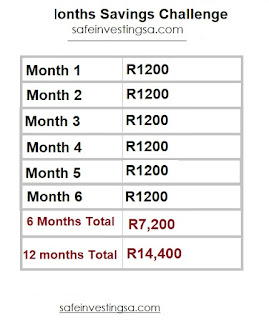We are looking at one more good interest bearing emergency fund account. You may refer to Capitec's Global One account in the previous post. Again, I confirm that we are not paid by below mentioned service providers to provide this information.
Our Twitter handle @SafeInvestingSA asked a question:
This is the only one day or 24 hour notice account that we know of. I find the notice account with only one day notice fascinating. One day notice is long enough to ensure one sleeps on the decision to withdraw funds, whilst it is short enough to take care of an emergency.
One can use their debit account for monthly stop orders into this money market account. A great idea to ensure that one pays themselves first. This account earns interest from 4% at the time of publication of this article. The higher the balance the higher the interest earned. JustInvest also attracts no monthly fees. The interest on the balance at the tie of publication is:
Below R2,500 interest is at 4%; R2,500 – R24,999 at 5,25%; R25,000 – R49,999 at 5,75%; R50,000 – R99,999 at 6,2%; R100,000 – R249,999 at 6,3%; R250,000 – R499,999 at 6,35%; R500,000 – R999,999 at 6,4% and R1 million and above at 6,5%
For our emergency savings of R5,000 to R10,000 our interest bearing emergency fund account earns about 5%. This is not a bad interest on only one day notice.
I trust that you have started with the savings challenge. We have four steps and groups. 1. Debt pay-up, 2. Emergency Fund, 3. Other Savings Accounts, and 4. Investments. Please do keep moving. Start slow but do not stop. For daily motivation like us on Facebook, Twitter and/ or Instagram.
Our Twitter handle @SafeInvestingSA asked a question:
"Do all banks have an interest bearing 24-hour or 1 day notice account that requires an initial investment amount of below R1000. Our #SavingCommunitySA needs that or similar for individuals."
 |
| interest bearing emergency fund account |
Nedbank was one other bank that responded as follows:
"We have various Investment accounts with different offerings and minimum Investment amounts. Click on the link for more info on our account: xxx :)".We have looked at the Nedbank money market accounts and came up with the one that is most suited to the Emergency Fund. JustInvest account is our interest bearing emergency fund account of choice. One may start very slow as the minimum investment amount is only R500. This makes it ideal for the new savers.
This is the only one day or 24 hour notice account that we know of. I find the notice account with only one day notice fascinating. One day notice is long enough to ensure one sleeps on the decision to withdraw funds, whilst it is short enough to take care of an emergency.
One can use their debit account for monthly stop orders into this money market account. A great idea to ensure that one pays themselves first. This account earns interest from 4% at the time of publication of this article. The higher the balance the higher the interest earned. JustInvest also attracts no monthly fees. The interest on the balance at the tie of publication is:
Below R2,500 interest is at 4%; R2,500 – R24,999 at 5,25%; R25,000 – R49,999 at 5,75%; R50,000 – R99,999 at 6,2%; R100,000 – R249,999 at 6,3%; R250,000 – R499,999 at 6,35%; R500,000 – R999,999 at 6,4% and R1 million and above at 6,5%
For our emergency savings of R5,000 to R10,000 our interest bearing emergency fund account earns about 5%. This is not a bad interest on only one day notice.
I trust that you have started with the savings challenge. We have four steps and groups. 1. Debt pay-up, 2. Emergency Fund, 3. Other Savings Accounts, and 4. Investments. Please do keep moving. Start slow but do not stop. For daily motivation like us on Facebook, Twitter and/ or Instagram.














